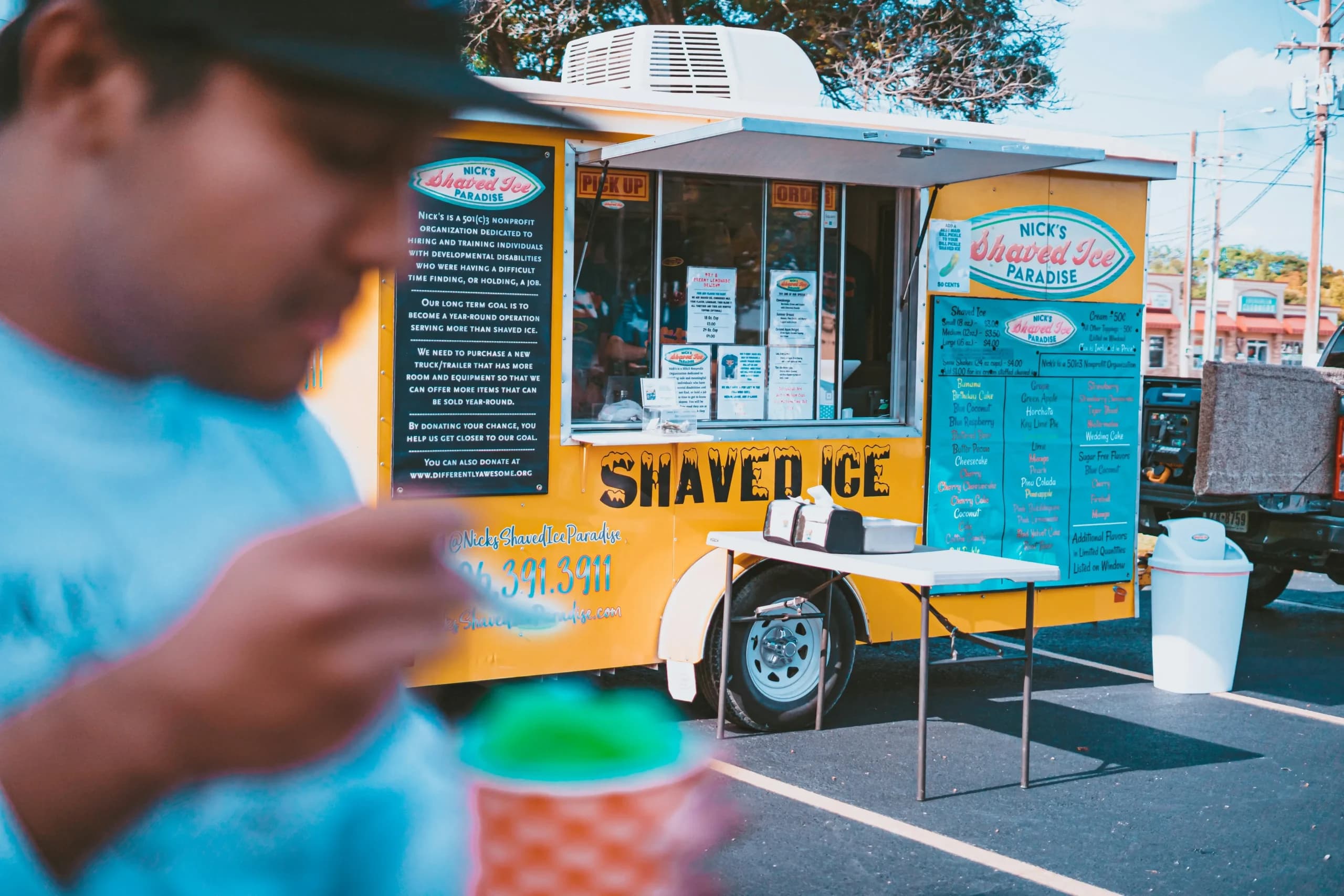Summary
Location: New Mexico, USA
Food trucks in New Mexico can only operate legally after obtaining multiple licenses and permits. These include business registration, food permits, food handler cards for employees, and at least one certified food protection manager (CFPM) on staff. Certain cities and counties might also ask for area-specific requirements.
Key regulations for New Mexico food trucks:
- Businesses must register with the New Mexico Secretary of State to operate legally.
- Retail businesses must obtain a Gross Receipts Tax Permit for authority to collect and remit tax on taxable items.
- All food trucks must obtain food permits from the New Mexico Environment Department (NMED). The application process involves submitting a comprehensive application packet, which includes a proposed menu, copies of plans and specifications, and MVD registration.
- All employees involved in food handling need to hold food handler cards from organizations with American National Standards Institute National Accreditation Board (ANSINAB) accreditation.
- Food trucks need at least one ANSI ANAB-accredited CFPM on staff.
With its diverse culinary scene, steady tourist traffic, and thriving outdoor recreation culture, New Mexico lends aspiring food truck operators many opportunities to thrive. However, before driving headlong into New Mexico’s food truck market, it’s important to develop a deep understanding of the state’s licensing requirements. Adequate preparation will set you up for smooth operations in the long run.
1. Business registration
Like any other business, food trucks must register with the New Mexico Secretary of State to operate legally. This is a requirement for all limited partnerships, limited liability companies, corporations, or S-corporations, but not sole proprietors and general partnerships. By registering, you establish your business as a separate legal entity, making it subject to business-specific regulations, taxes, and benefits.
2. Gross receipts tax permit
Food trucks must also obtain a Gross Receipts Tax Permit from the New Mexico Taxation and Revenue Department. This permit allows you to collect and remit state and local sales taxes on food truck sales. Application is typically free.
3. Food permit
New Mexico law requires all types of food establishments, including food trucks, to secure a food permit from the New Mexico Environment Department. Completion of this requirement proves that your business meets the state’s standards for health and food safety.
The process involves filling out a thorough application form, which includes a plan review application that dives deeper into the specifics of your planned food truck operations. You will be asked to provide information about the following:
- Your food truck floor plan
- Plumbing
- Mechanical plans and schedules
- Electrical plans and schedules
- Your site plan
- Chemical and personal items
- Food handling processes
You are required to submit your proposed menu, plus copies of your construction plans and specifications. Depending on your operations, you will also need to provide supporting documents and approvals. We go deeper into each requirement below.
Proposed menu
The NMED reviews your menu to determine the required food preparation, handling, and storage processes. Based on this, they may recommend specific layout, facility, and equipment requirements to support proper workflows.
Plans and specifications
You must submit a copy of your floor plan drawn to scale, with necessary labels for equipment. This helps the NMED assess whether your layout and facilities support your proposed food preparation, handling, and storage workflows.
Newly constructed, renovated, or remodeled food trucks must also submit their mechanical and electrical plans.
- Mechanical plans should identify the location and specifications of ventilation hoods and fire suppression systems. It should also provide a ventilation schedule detailing the exhaust capacities for all kitchen hoods and exhaust fans in cubic feet per minute.
- Electrical plans indicate the locations and specifications of all lights.
Proof of MVD registration
You cannot drive a motor vehicle in New Mexico without first registering it with the Motor Vehicle Department (MVD). To ensure that your food truck is roadworthy, meets safety regulations, and is legally yours, the NMED requires you to include proof of MVD registration with your food permit application.
Water sample test results (if applicable)
If you plan to connect to a private water system, you are required to provide the written laboratory results that prove your water meets the state’s standards of drinking water quality. These tests analyze the coliform, nitrate, and nitrite content of your water.
Note that the NMED only accepts tests from its list of certified labs.
Servicing area agreement (if applicable)
If you are supporting operations with a food truck commissary or base of operations, you need to submit a serving area agreement. Should you choose to partner with a servicing area, it needs to have its own NMED food permit. The NMED will not allow you to operate until it approves your servicing area.
4. Food handler card
New Mexico law requires all food employees involved in handling food, utensils, and food-contact surfaces to complete food handler training. This training they understand proper food safety practices, helping to prevent foodborne illnesses and other health hazards.
Food truck employees are exempt from needing food handler cards if they meet one or more of the following requirements:
- They have CFPMs
- They exclusively handle non-Time and Temperature Control for Safety Foods
- They are working at a temporary event under the oversight of a CFPM or an employee with a food handler card
- The NMED has approved the food truck to administer its own food safety training program
Your employees can earn a valid food handler card by completing courses from ANSINAB-accredited organizations. Most courses cost around $10 or more and can be completed online.
5. Certified food protection manager (CFPM)
All food establishments are also required to employ at least one CFPM to oversee day-to-day kitchen operations. CFPM certification and training help food workers develop a deeper understanding of food safety practices, including the creation, implementation, and maintenance of food safety policies. The oversight of CFPMs helps reduce the risk of food-related hazards in the establishment.
To earn a CFPM credential, you must pass an exam from an ANSI ANAB-accredited organization. Some providers offer only the exam, while others include full training programs. CFPM certification typically costs between $25 and $130, depending on the provider and what the program includes.
6. Jurisdiction-specific requirements
The above requirements apply statewide. However, certain cities or counties may impose their own independent regulations. They might request additional licenses such as business licenses, peddlers’ licenses, fire permits, or health department approvals.
Some cities and counties might also override state requirements. The city of Albuquerque, for example, has its own mobile food vendor permit with an independent application and approval process. Check with the cities and counties you plan to operate in for more details about their food truck regulations.
Renewal schedule for New Mexico food trucks
Obtaining licenses is rarely a one-time task. Food truck licenses require regular renewals to account for potential changes in your business or in the state’s regulations.
To keep your operations running smoothly, it’s important to track renewal deadlines. Renewing on time helps you avoid fines, shutdowns, and other legal issues.
| Requirement | Issuer | Renewal schedule | Notes |
| Business registration | Secretary of State | Annually | Requires submission of annual report |
| Food permit | Environment Department | Annually | Costs $200 |
| MVD registration | Motor Vehicle Department | One to two years | Fees depend on county and vehicle |
| CFPM certification | Any ANSINAB-accredited CPFM exam provider | Every five years | Required for at least one staff member involved in daily operations |
| Food worker card | Department of Environmental Conservation | Annually | Costs $10 and required within 30 days of hire for all employees involved in food preparation and kitchen sanitation |
What to do if your food permit application is denied in New Mexico?
If New Mexico denies your food permit application, you’ll receive a written notice explaining the reasons. Common causes include incomplete documentation, failure to meet food safety standards, or non-compliance with local or state regulations.
If you disagree with the decision, you may request a hearing by submitting a written appeal to the Secretary of the New Mexico Environment Department (NMED) within 10 calendar days of receiving the notice. A well-prepared response may lead the department to reverse its initial decision.
In your request, you should include:
- A statement of the factual issues in dispute
- Any defenses, mitigating factors, or explanations
- Names of any witnesses (if applicable)
- Contact information for legal counsel (if applicable)
Additionally, if the denial is due to correctable issues, addressing them promptly can strengthen your case during the appeal process. For example, if the NMED rejected your application over safety violations, correcting those violations before the hearing might increase the likelihood of approval.
If the reasons the notice provided are valid, or if you failed your hearing, your only choice is to resubmit your application. The state has no mandatory waiting period for reapplication as long as you amend all violations or shortcomings. However, other cities and counties may have their own reapplication timelines.
What to do if your food permit is revoked in New Mexico?
Appealing a revoked permit follows the same process as appealing a denial. If you disagree with the reasons listed in the notice or have corrected the issues, you may request a hearing with the NMED within 10 calendar days of receiving your notice. A clear, well-supported argument, backed by documentation and proof of corrections, can significantly improve your chances of having the revocation overturned.
En route to success with 7shifts
Starting a food truck business in New Mexico can be a promising endeavor, especially if you’re well-prepared. To keep your food truck running with zero interruptions, make sure to stay ahead of licensing, permitting, and documentation requirements. A proactive approach to paperwork helps you dodge fines, closures, and other legal setbacks.
Another way to ensure smooth operations is to support your business with streamlined restaurant management tools. With the leading workforce management platform, 7shifts, you can automate a wide range of administrative tasks, including communication, scheduling, and payroll. Eliminating the tedium of manual processes saves you time, money, and energy, allowing you to focus on delivering excellent service.

Rebecca Hebert, Sales Development Representative
Rebecca Hebert
Sales Development Representative
Rebecca Hebert is a former restaurant industry professional with nearly 20 years of hands-on experience leading teams in fast-paced hospitality environments. Rebecca brings that firsthand knowledge to the tech side of the industry, helping restaurants streamline their operations with purpose-built workforce management solutions. As an active contributor to expansion efforts, she’s passionate about empowering restaurateurs with tools that genuinely support their day-to-day operations.
